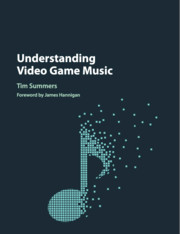Book contents
- Frontmatter
- Dedication
- Contents
- List of Figures, Musical Examples and Tables
- Foreword
- Acknowledgements
- Introduction: Beyond the Candelabrum
- PART I ANALYSING VIDEO GAME MUSIC
- PART II CRITICAL PERSPECTIVES
- Epilogue: Fun, Play and Music
- Appendix: How to Hear a Video Game: An Outline
- Bibliography
- Ludography
- Index of Games
- General Index
Foreword
Published online by Cambridge University Press: 05 September 2016
- Frontmatter
- Dedication
- Contents
- List of Figures, Musical Examples and Tables
- Foreword
- Acknowledgements
- Introduction: Beyond the Candelabrum
- PART I ANALYSING VIDEO GAME MUSIC
- PART II CRITICAL PERSPECTIVES
- Epilogue: Fun, Play and Music
- Appendix: How to Hear a Video Game: An Outline
- Bibliography
- Ludography
- Index of Games
- General Index
Summary
My first encounter with Tim Summers dates back to Ludomusicology in 2013, to which composer and University of Chichester academic Dr Stephen Baysted had invited me as a speaker. During my session, which took the form of a relaxed conversation, I was afforded an opportunity to discuss my work on a wide variety of game types and projects ranging from simulations and strategy titles such as Theme Park World, Freelancer and Command and Conquer: Red Alert 3 through to (at the time) recently completed projects such as Dead Space 3, and film tie-ins including the Harry Potter series.
For someone who had spent a large part of his waking life sitting in a darkened studio scrambling to meet deadlines – finding occasional respite in the creation of fun themes such as Soviet March, jazzy ditties for games like Evil Genius and high-octane electronica for EA Sports titles – attending Ludomusicology and encountering so many academics with an avid interest in games music I found to be enjoyable and validating in equal measure. At the very least, getting out to discuss the relationship between sound and music in games and some of the philosophical issues I care most about – such as the varying roles music can take in filmic, first- and third-person games – sure beats ‘slaving over a hot stave’, as my good friend the conductor Allan Wilson often quips when under the cosh.
Several conferences on games music I had attended before Ludomusicology I had found to be technically informative but rather inward-looking, industry-focused affairs devoted mostly to ‘how to’ presentations on integrating music in games, business arrangements, or the ‘novelty value’ of recording orchestras and musicians in ways that are, frankly, pretty familiar to any composers worth their salt or to practitioners peering in from other industries. Such a focus on production, tools and technology, rather than on the function and aesthetic details of music and what motivates it beyond simple visual cues and one-dimensional ‘game states’, is a long-term games industry bugbear for me. I can only explain this tendency away by pointing to gaming's initial emergence from Silicon Valley several decades ago, which must have entailed, I imagine, the carrying over of software industry values and computer terminology into the realm of entertainment as we now think of it.
- Type
- Chapter
- Information
- Understanding Video Game Music , pp. xi - xiiPublisher: Cambridge University PressPrint publication year: 2016



